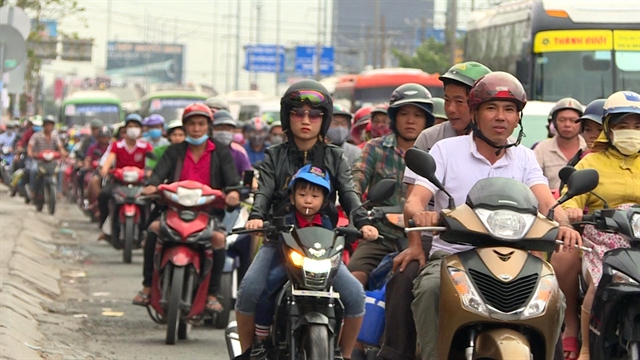 Society
Society

HCM City needs more than VNĐ950 trillion (US$41 billion) to invest in transport infrastructure from 2020 to 2030.

|
| Traffic jams regularly occur at the western gateway of HCM City during peak hours. The city plans to invest VNĐ950 trillion (US$41 billion) in transport infrastructure from now to 2030. — VNS Photo Nguyễn Diệp |
HCM CITY — HCM City needs more than VNĐ950 trillion (US$41 billion) to invest in transport infrastructure from 2020 to 2030.
The city’s Department of Transport has submitted its transport infrastructure development plan to 2030 to the People's Committee.
The plan includes 639km of roads, 78 bridges, 18 intersection projects, 32 static traffic projects, five projects under a smart urban programme, 211.9km of urban trains and bus rapid transit (BRT) routes, and 379km of inland waterways.
About VNĐ429 trillion ($18.5 billion) in funds are needed for transport infrastructure works from this year to 2025, and more than VNĐ523 trillion ($22.5 billion) from 2025 to 2030.
Of the total investment capital, more than VNĐ457 trillion ($19.7 billion) will be allocated from the city’s State budget and the remainder will be sourced from the Central Government budget as well as public-private-partnership investment, official development assistance (ODA) and other sources.
The city’s State budget will be used to carry out programmes to reduce traffic congestion and accidents, key transport infrastructure, compensation payments for land clearance for ODA projects, and transport projects that connect Tân Sơn Nhất International Airport and Cát Lái Port, and the Hiệp Phước Port project.
Other capital sources will be used for the Belt Ring Road No 3 and 4 projects, expressway projects, Cát Lái and Cần Giờ bridges, metro lines, inland waterway ports and dry ports, new inter-provincial bus stations, BRT and cargo terminals.
The department in collaboration with the Southern Transport Consultation and Designing Joint Stock Company (Tedi South) will carry out the plan. It will draw up a roadmap for a modern transport infrastructure system that improves connectivity and reduces congestion and accidents.
It will also focus on research to develop radial axes, high-capacity highways, ring roads and inter-regional links and roads to new urban areas and industrial parks, as well as urban roads linking new urban areas, industrial parks, waterway ports and airports.
In the 2016-20 period, the city completed 51 of 172 key transport projects, reaching 29.7 per cent of its target.
They include Phú Hữu Bridge on the Eastern Ring Road, an upgrade of Phạm Văn Đồng Street; expansion of Phú Hữu Port; and building an overpass at theTrường Sơn-Tân Sơn Nhất - Bình Lợi - Outer Belt road intersection, the An Sương tunnel, the Mỹ Thủy underground tunnel and an intersection at National University of HCM City. — VNS